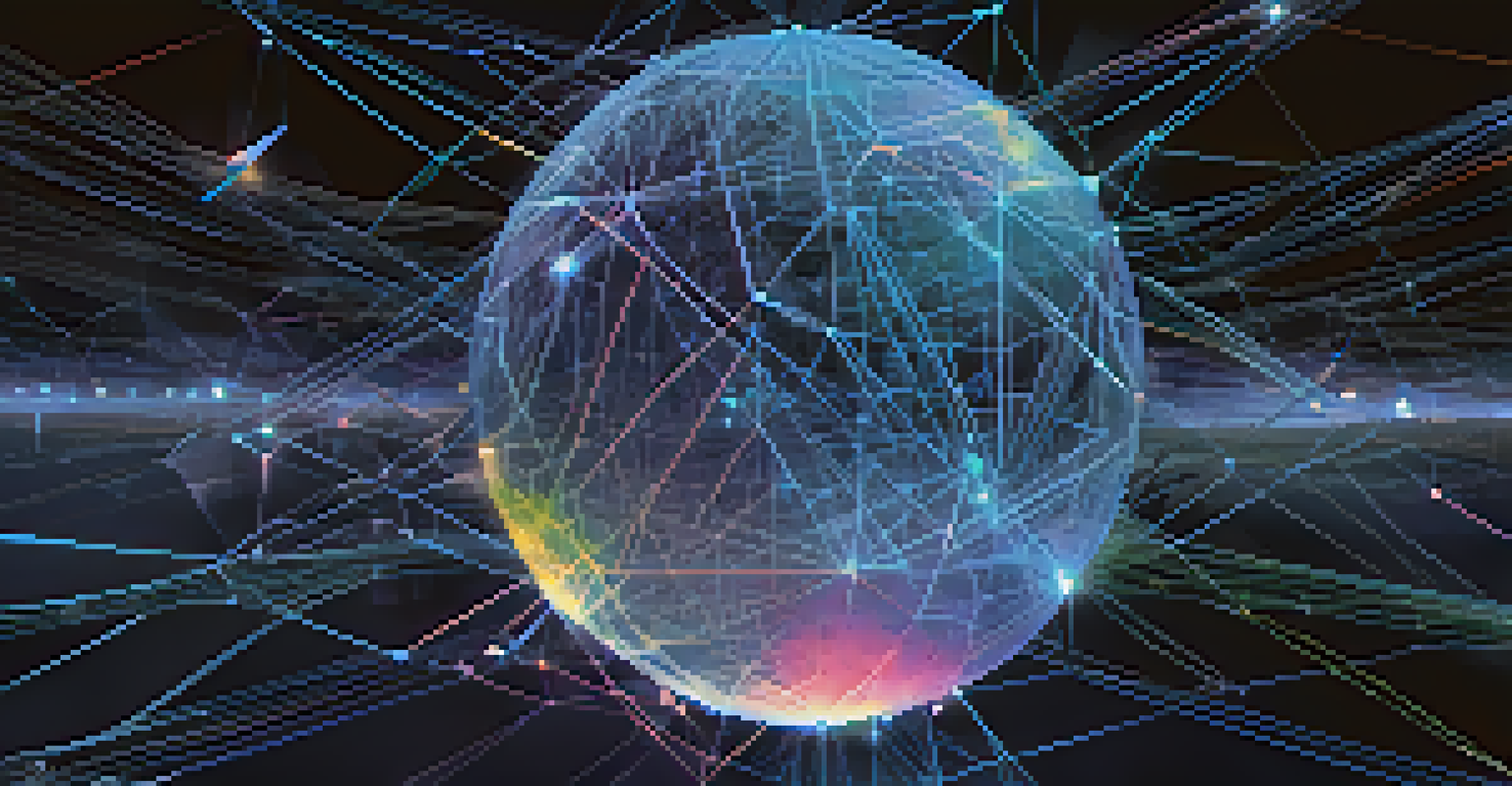The Future of Oracles: Innovations Shaping Blockchain Systems

Understanding Oracles: The Bridge to Real-World Data
Oracles play a crucial role in connecting blockchain systems to real-world data. They act as intermediaries that fetch, verify, and deliver external information to smart contracts on the blockchain. Without oracles, blockchains would remain isolated, unable to interact with the outside world and limiting their potential use cases.
Oracles are essential to the blockchain ecosystem, serving as the critical link between real-world data and smart contracts.
Imagine oracles as the translators between two different languages: the blockchain's language and the language of real-world data. This translation is vital for applications such as decentralized finance (DeFi), where accurate price feeds are essential for executing trades and managing risk. By enabling these connections, oracles empower a wide range of functionalities and innovations within blockchain ecosystems.
As we look to the future, the evolution of oracles will significantly impact the reliability and functionality of blockchain systems. With advancements in technology and increased demand for data transparency, understanding how oracles operate is the first step in appreciating their transformative potential.
Decentralization of Oracles: A Game Changer
Decentralized oracles are emerging as a solution to the single point of failure problem associated with centralized oracles. By distributing the data-fetching process across multiple sources, decentralized oracles enhance security and reliability. This means that even if one source fails or provides incorrect data, the overall system remains robust and trustworthy.

Think of decentralized oracles as a group of friends gathering information rather than relying on just one person. Each friend brings their insights, and together they form a more accurate picture of reality. This collaborative approach reduces the risk of manipulation and enhances the integrity of the data delivered to blockchain applications.
Oracles Connect Blockchain and Data
Oracles serve as intermediaries that fetch and deliver real-world data to blockchain systems, enabling a wide range of functionalities.
The shift towards decentralized oracles is not just a trend; it’s a necessary evolution to ensure the long-term success of blockchain technology. By embracing this model, developers can create more resilient systems that users can trust, paving the way for new applications and services.
Innovative Use Cases: Beyond Basic Data Retrieval
Oracles have expanded beyond mere data retrieval to support innovative use cases across various sectors. For instance, they can facilitate insurance claims by automatically processing real-world events, such as weather data, to validate claims. This ability to automate complex processes significantly reduces the time and effort involved in traditional systems.
Decentralized oracles are the future; they eliminate single points of failure, ensuring data integrity and security.
Consider a crop insurance policy that pays out when rainfall falls below a certain level. An oracle can monitor weather data in real-time and trigger the payout automatically when conditions are met. This not only improves efficiency for insurers but also provides peace of mind for farmers, showcasing how oracles bridge gaps in traditional industries.
As we embrace these innovative applications, the potential for oracles to create more efficient and transparent systems becomes increasingly evident. The future holds exciting possibilities for oracles to revolutionize industries such as finance, healthcare, and logistics, making them a vital component of the blockchain ecosystem.
Smart Contracts: Enhanced Functionality Through Oracles
Smart contracts are self-executing contracts with the terms directly written into code. By integrating oracles, these contracts can access real-time data, making them more dynamic and responsive to external conditions. This integration allows for more complex contractual agreements that can react to changing circumstances without human intervention.
For instance, a smart contract in a decentralized finance platform can adjust interest rates based on market conditions by pulling data from oracles. This leads to fairer and more accurate financial products, which can adapt in real time to external factors. The synergy between smart contracts and oracles is transforming how agreements are executed in the digital realm.
Decentralization Enhances Oracle Security
Decentralized oracles distribute data-fetching across multiple sources, reducing risks of manipulation and increasing reliability.
As developers continue to harness this power, we can expect to see more sophisticated applications that leverage the full potential of smart contracts. This evolution will lead to new business models and opportunities, pushing the boundaries of what’s possible in decentralized applications.
Security Challenges: Protecting Oracle Networks
While oracles significantly enhance blockchain functionality, they also introduce security challenges. The reliance on external data sources can make systems vulnerable to manipulation or inaccurate data feeds. If a malicious actor compromises an oracle, they can potentially disrupt the entire blockchain application relying on that data.
This scenario is akin to a trusted friend spreading false information, which can lead to poor decisions. To combat these risks, developers are exploring various solutions such as cryptographic proofs and multi-signature setups to bolster oracle security. By ensuring that data is verified from multiple sources, the integrity of the information delivered to smart contracts can be maintained.
As the use of oracles becomes more widespread, addressing these security concerns will be critical. The ongoing development of robust security protocols will help establish trust in oracles, ensuring they remain a safe and reliable component of blockchain technology.
The Role of Governance in Oracle Networks
Governance is essential for the effective operation of oracle networks, ensuring that data integrity and accuracy are maintained. Decentralized governance models allow stakeholders to participate in decision-making processes, such as determining which data sources to use. This collaborative approach fosters transparency and accountability within the oracle ecosystem.
Think of governance in oracle networks as a community council where everyone has a voice. By involving various stakeholders—developers, users, and data providers—governance mechanisms can adapt to changing needs and maintain the reliability of the system. This inclusivity not only enhances trust but also encourages innovation within the network.
Governance Ensures Oracle Integrity
Effective decentralized governance models promote transparency and accountability, crucial for maintaining data integrity in oracle networks.
As governance structures continue to evolve, they will play a pivotal role in shaping the future of oracles. By prioritizing community engagement and collaborative decision-making, oracle networks can ensure they remain resilient and relevant in the rapidly changing blockchain landscape.
Future Trends: What Lies Ahead for Oracles
The future of oracles is bright, with several trends set to shape their evolution in the coming years. One significant trend is the increasing integration of artificial intelligence and machine learning, which can enhance data verification processes and improve the accuracy of data feeds. This technological fusion will likely lead to smarter, more efficient oracles that can adapt to complex scenarios.
Picture oracles equipped with AI as highly skilled analysts who can sift through vast amounts of data to provide the most accurate information. This capability will not only enhance the reliability of oracles but also expand their applicability across various industries. As businesses seek to leverage blockchain technology, the demand for advanced oracle solutions will grow.

Additionally, the rise of cross-chain oracles will facilitate interoperability between different blockchain networks. This trend will enable seamless data sharing across platforms, unlocking new possibilities for collaboration and innovation. As these trends come to fruition, oracles will undoubtedly play a central role in revolutionizing how we interact with data in the blockchain space.